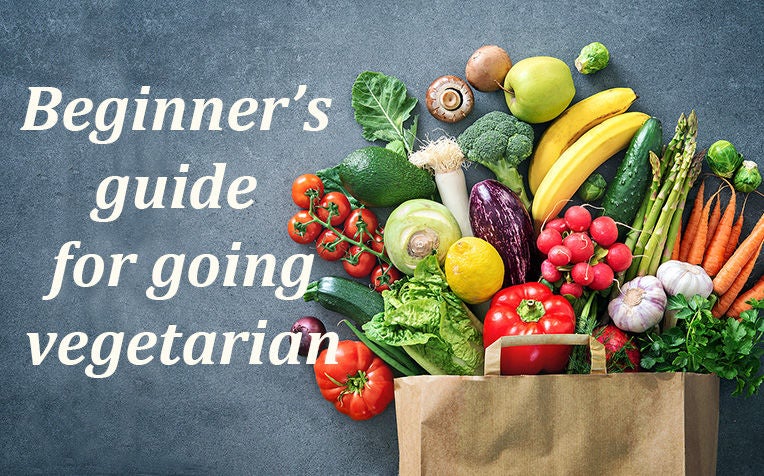1. Vegetarian diets vary widely—from vegan to pescatarian—each excluding different animal products, promoting health benefits like reduced disease risks with proper planning.
2. A well-planned vegetarian diet includes diverse plant foods, dairy for some, balancing nutrients crucial for health while reducing saturated fats.
3. Transition gradually, balance meals with fruits, vegetables, legumes, nuts, and whole grains to meet nutritional needs; prioritize fresh, minimally processed foods and healthy cooking methods.

A well-balanced vegetarian diet comprise of vegetables, fruits, whole grains, legumes, nuts and seeds. Apart from these, dairy foods like milk, cheese and yoghurt should also be included, if possible.
What type of vegetarian do you want be?
Considering of cutting meat from your diet? To begin, there are varying types of vegetarian diets that exclude different foods. The list includes:
Vegan (or strict vegetarian) who consume only plant-based foods and exclude all animal products
Ovo-lacto-vegetarian who consumes plant-based foods, eggs and milk products
Lacto-vegetarian who consumes plant-based foods and milk products
Ovo-vegetarian who consumes plant-based foods and eggs
Pescatarian who consumes plant-based foods, fish, seafood, egg and milk products
Pollo-vegetarian who consumes chicken, plant-based foods, fish, seafood, egg and milk products
Semi-vegetarian who avoids animal products on some days
A vegetarian diet is generally low in saturated fat and cholesterol, and high in fibre and phytochemicals. Adopting a vegetarian diet has been shown to reduce risks of obesity, heart disease, hypertension, type 2 diabetes and certain cancers such as breast, colorectal and prostate cancers. However, as with all diets, it is important to ensure that the food consumed is able to provide for our daily nutritional needs.
A well-planned vegetarian diet would comprise a variety of vegetables, fruits, whole grains, legumes, nuts and seeds. Apart from these foods, individuals should also include dairy products like milk, cheese and yoghurt, if possible. This helps to ensure that the diet provides adequate nutrition to support good health for people of all ages.
On the other hand, a poorly planned vegetarian diet may lack many important nutrients, including protein, iron, Omega-3 fatty acids, calcium and vitamin B12. Individuals may consider consulting a medical doctor to seek advice for starting on supplements if they are unable to meet their daily nutrient requirements through diet alone.
Senior Dietitian Ng Hwa Ling and Dietitian Jodie Yeo from Sengkang Community Hospital (SKCH), managed by SingHealth Community Hospitals (SCH), a member of the SingHealth group, share some ways to cut the meat but still eat well.
5 Tips to go vegetarian the healthier way
1. Start slow
Consider having vegetarian meals one day per week, such as ‘Meatless Monday’, before increasing the frequency gradually. A sudden drastic increase in our intake of fruits and vegetables may result in bloating, gas and stomach cramps as undigested fibre ferments in the large intestine.
2. Balance is key
Refer to Health Promotion Board’s ‘My Healthy Plate’ to achieve a balanced diet. Fill half of your plate with a variety of fruits and vegetables, a quarter with beans, legumes or soy products and another quarter with whole grains such as brown rice or starchy vegetables.
3. Introduce variety
Meet your nutritional needs with a wide variety of foods. For example, legumes (such as dried beans, peas and lentils) and soy products (such as tau kwa) are sources of plant-based protein, calcium and iron. Nuts and seeds (such as almonds, walnuts, flaxseed, chia seed) provide essential fatty acids, calcium, iron and B vitamins. Green leafy vegetables are good sources of iron, calcium and vitamin C, and fruits are generally rich in Vitamin C.
Having a variety of foods can help you enjoy your meals more, which makes going vegetarian more sustainable in the long run.
4. Fresh is best
Choose whole, unprocessed or natural foods and minimise your intake of highly processed foods. Also, select low fat options such as low fat milk.
5. Remember the basics
While choosing the right food is important, the method of preparation is also key. Opt for healthier cooking methods like steaming, grilling or baking instead of deep frying.
Ref: K21
Check out other articles on diet:
Tips for Women Becoming Vegetarian
Are You Gluten Intolerant? 8 Diet Tips To Help
Soy vs Dairy (Cow's Milk): Which is Better?

















 Get it on Google Play
Get it on Google Play